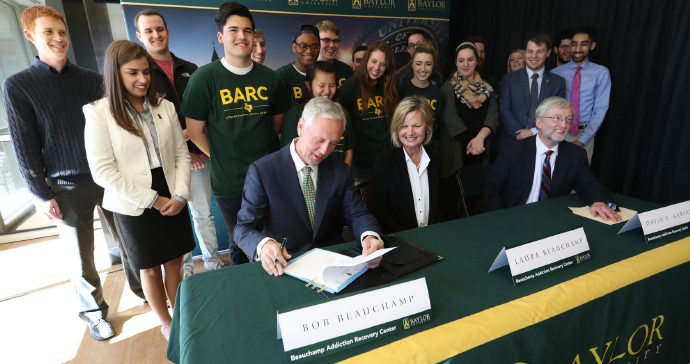Beauchamp Addiction Recovery Center Expands Services for Students
Bob and Laura Beauchamp with Interim President David E. Garland sign the gift agreement to establish the Beauchamp Addiction Recovery Center at Baylor

The creation of the Beauchamp Addiction Recovery Center (BARC), announced in January, is another step forward in Baylor’s continued commitment to meeting the needs of students.
The BARC is part of a broad effort at the university to advance the well-being of its students. The multifaceted program will dramatically enhance Baylor’s efforts to foster the holistic well-being of its students in a manner that reflects the university’s values as a Christian community where wholeness, spiritual growth and academic success are priorities.
Made possible by a lead gift from Bob and Laura Beauchamp of Houston, the BARC launches the first phase of the Christian Character Initiative coordinated through the Provost’s Office. With an initial $20 million fundraising goal, the Initiative reinforces Baylor’s long-standing commitment to a Christ-centered education, bringing together a range of programs and experiences in a coordinated and powerful endeavor to help students thrive and flourish.
“Laura and I strongly believe that young men and women who are struggling with addiction should be supported and treated with compassion and grace,” Bob Beauchamp, chair of BMC Software and a Baylor Regent, said. “We believe Baylor as a Christian university should be the best in the world at supporting its students who are struggling. Removing the stigma of addiction is crucial to ensuring that students feel they can seek out resources to help them overcome their challenges and fully realize all that God is calling them to become. Our family is honored to help Baylor raise awareness about substance use disorders and support addiction recovery, and we hope others in the Baylor family will come alongside us in supporting this effort.”
On college campuses across the nation, young men and women are navigating a host of complex issues as they deal with the challenges and changing responsibilities of college life. For some, such challenges include alcohol and substance use disorders. The nation’s college student population is disproportionately affected by this problem, as alcohol and illicit drug use is highest among 18- to 25-year-olds compared to any other age group. Research indicates that 31.6 percent of college students across the country meet the criteria for substance use disorders. Baylor’s students encounter the same challenges as their peers nationwide.
Baylor has consistently sought to educate its nearly 17,000 students about the negative consequences of alcohol and drug use and to care for those in recovery from compulsive behavior and addiction. However, more needs to be done, both at Baylor and nationwide, to prevent substance use disorders and to provide support to students in recovery.
BARC will provide support services for students who are in the initial stages of identifying an addiction, including counseling and possible referral to off-campus rehabilitation, as well as continued support for students who have completed rehabilitation programs. The program also provides reintegration support for students who may have left school and for students who are already in recovery. Until now, Baylor’s continuum of care has included recovery support services through the Baylor Counseling Center and Wellness Office.
With the creation of BARC, Baylor is expanding that continuum to include a dynamic array of on-campus recovery services to support students and strengthen prevention education and intervention support.
The Center, to be located in East Village Residential Community, will create a friendly recovery community culture for students to connect between classes, study, host community and recovery support events and hold meetings. The endowment will support increased staff and programming, including weekly support and community recovery meetings, recovery coaching and conversations with mentors as well as campus-wide educational outreach efforts that identify social environmental influences, provide education on the support services that are available at Baylor and encourage peer-to-peer support.
Bob Beauchamp earned a BBA from the University of Texas and an MS from Houston Baptist University, while Laura Beauchamp earned a BBA from the University of Texas. They have four sons and two daughters-in-law, five of whom have been or currently are Baylor students: Jack Beauchamp, BBA ’10, and his wife, Hayley Beauchamp, BS ’10; Tom Beauchamp, BBA ’12, MAcc ’12, and his wife, Christina Beauchamp, BS ’12; George Beauchamp; and Jim Beauchamp.
“Being a part of our sons’ education at Baylor has allowed us to increasingly appreciate what the university offers to its students and the difference it makes in the world,” Laura Beauchamp said. “As college students face transition from home life to independence, many get caught up in unhealthy decisions that they need help changing. If students want help, we want them to know where they can go for support to help find freedom from addiction.”